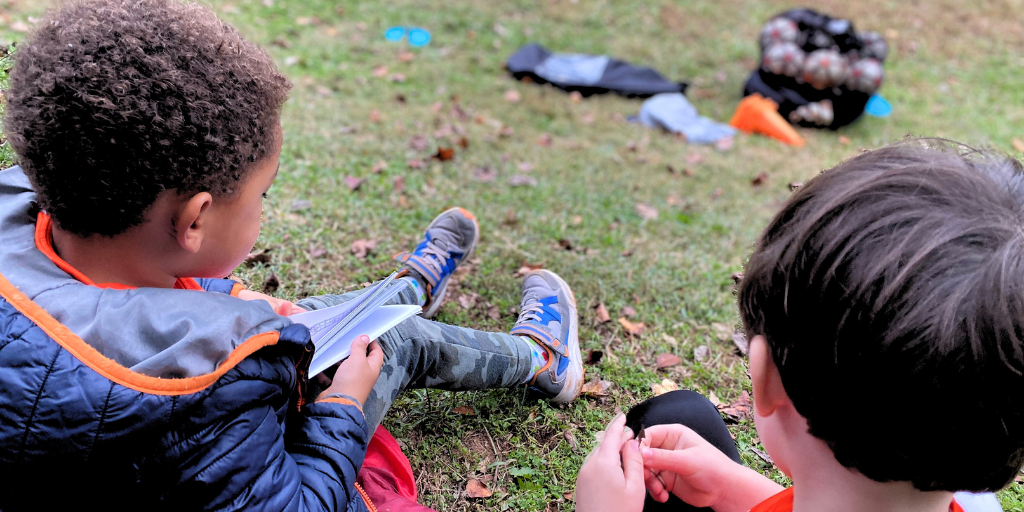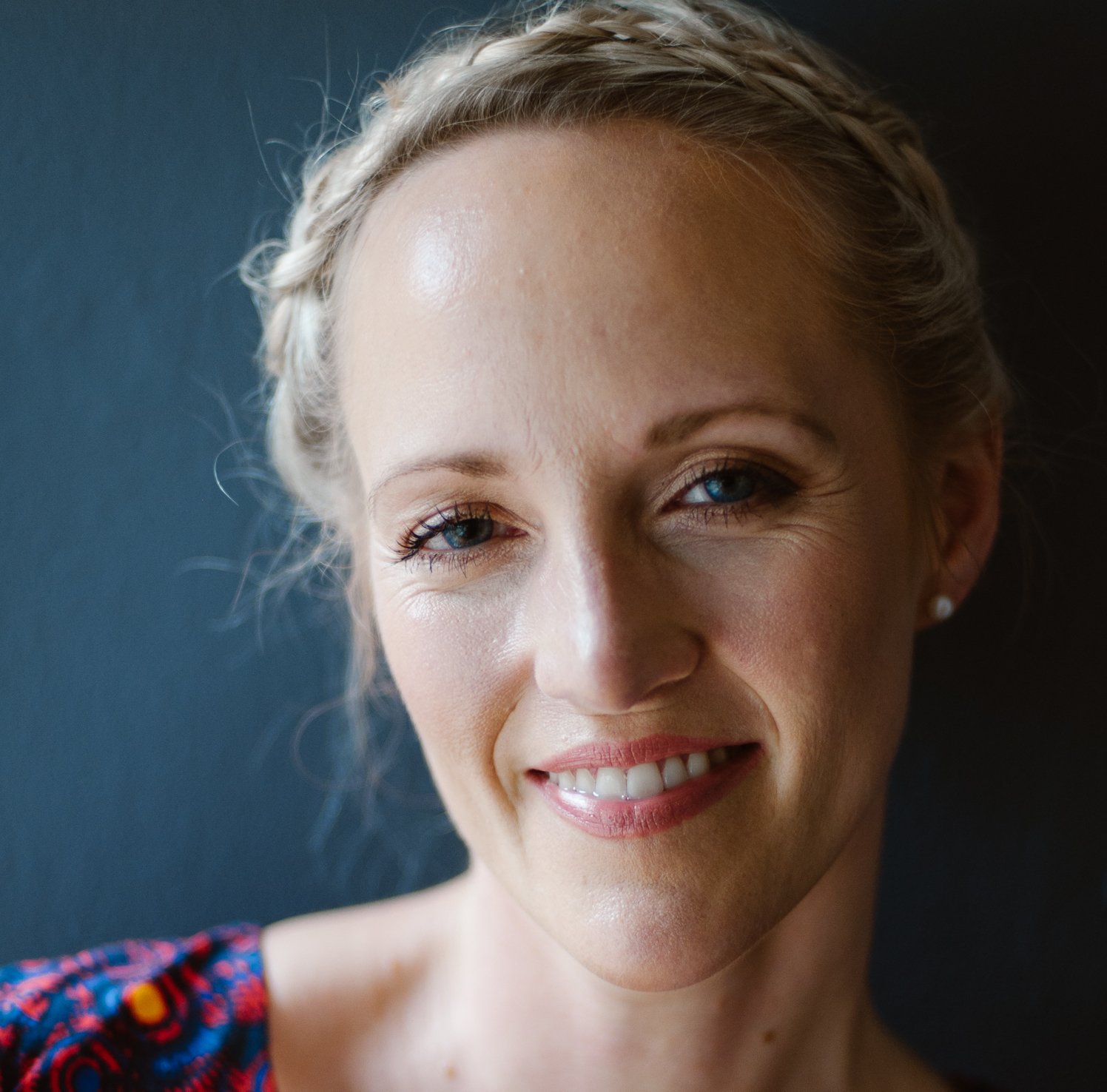
Johanna Stamps interviews her friend Caitlin Bootsma about Caitlin's new children's book, Detective Thomas and the Biggest Question.
Caitlin Bootsma and I are sitting next to the soccer field at Byrd Park in Richmond, VA on a cool Monday evening. Our little ones are engaged with their coaches in a soccer clinic. As a friend, I have had the privilege of seeing the creative journey of the book and I have been thrilled to see the response from the public. Today I get to play a new role: the interviewer.

How do you explain the book to others?
Detective Thomas and the Biggest Question is a philosophy book for kids in detective story form. It’s a mystery and it’s fiction. Kids follow along with Thomas’s journey. At the same time, they understand the “why” of our faith and uncover those mysteries with Thomas.
What do you hope people will take away from reading Detective Thomas?
I hope they understand that our faith is not separate from reason and that God created reason. So, our faith is reasonable and that’s what we explore when we ask this question: “Can we come to know God?” And we can, not just through our faith which is very important, including the revelation of Scripture and the Mass and all of these things, but also in using the brain that God gave us.
Where did the idea of the book originate from?
It originated with my son Gus, who is now 11 years old. When he was seven and we were sitting at the dinner table one evening he turned to me, looking somewhat mischievously, and asked, “What if I don’t believe in God?” My internal response was, “Oh my! My son is now 7 years old and he doesn’t believe in God!” I quickly calmed down and realized he had asked me a question and I’m glad he asked me a question and there is an answer.
My husband and I started talking through this idea with him of how we can know that God exists but we did that by asking him questions and inviting him into the process. We would ask him questions like, “How do clouds form?” He would respond with the scientific answers and then we would respond with, “Yes, but who made that and where did the atmosphere come from?” We were tracing things back logically. What we were really doing was exploring Thomas Aquinas’ Five Proofs for God’s existence, which is what the book is based on, and he understood at that young age.
That simmered for a while and a couple of months later I woke up and had a whole idea for a book and thought: “If he can figure this out then so can other kids.” I think it’s so worthwhile. I ended up writing the first draft in a month and did a lot more work after that, but it was there in its form pretty quickly.
How has this journey continued to help your own child and your relationship with him?
Gus is so curious and he really felt like he was getting answers and that he could ask questions and that’s okay. I don’t know if kids always feel that way but we really encouraged him. He loves to read and study and so he was able to enter into his faith in that way. So, now he is asking questions like: “Can we believe in evolution and can the science of this go along with our faith?”
What is your favorite part of the book?
My boys would be really mad if I didn’t say Charlie, the younger brother of the main character Thomas. He is a comic character but underneath all his goofiness he is quite smart but in a different way from Thomas. You see him come to the same questions in different ways and he inadvertently contributes to solving the mystery. Also, the dynamic between the two brothers is fun to write. I found myself laughing along with them as if Charlie had taken on a life of his own.
What’s in store for the series?
There are definitely more Detective Thomas books in the works with big appearances by Charlie and other characters. No official news on that front just yet but the series could continue the theme of using reason and logic to answer the big questions of our faith. This might include: “Why does it make sense that we have a savior and why do we need one? Why does Mary appear to people on earth? What is the Eucharist really? How can we know all these things are true?” My hope is that a series would engage kids and their parents. I want them to be entertained by it but also help solve the mysteries themselves so they can answer the questions for themselves or other people who might challenge that.
How else do you hope the book will be used?
Because of the “Reality Labs” that have been placed throughout the book it could be read-aloud as a family and work it out together or once a week, individually read and then discuss it. It could also be used in religious education or it could be Catholic classroom-adjacent. Maybe they are studying some of these things but then they have the fiction to back it up.
I would imagine that not every adult is familiar with these answers and so I love the idea of parents reading this book for themselves. I read a lot of kids books for myself. I enjoy reading great literature but also YA and so much more! So, I hope there will be some adults that find this kids format is quite instructive for them. Perhaps they won’t pick up Thomas Aquinas’s Summa Theologica, but they can read this and then they know.
How would you like priests to use and engage with the book?
I think it gives an adult a different way of engaging with children. While fiction is amazing in its own right, it doesn’t need to be a tool but it can be. So, whether the priest is using the Detective Thomas book or perhaps a similar analogy approach of teaching the faith to children rather than just laying out the teaching. That might be an interesting way of exploring catechesis.
Why do you think this book is important right now?
The CARA study out of Georgetown is showing us that young people are losing their faith younger and younger. So, we used to focus on young adults or later high schoolers but now the number of people who lose their faith before they become a teen has risen dramatically.
The secular world seems to say, “Religion is fine if that’s something you want to do on Sundays but if you want to be in the real world the rest of the week this is what makes sense.” Sometimes we don’t give enough of the answer. What we could respond with is, “Actually, the fullness of reality is in the Catholic faith and you can find those answers here.”
There is a huge need to equip people even just for themselves. So when they face those hard questions or the doubts that we all do they are able to think back to these answers.
How important is it to you that a child that reads this book is able to share the information with their friends?
A lot! You see that scenario in the book with Mateo challenging Thomas by asking, “Why does it matter that you go to Mass? Why is it important? I don’t get this whole God thing.” This is such a natural thing to ask if you don’t understand the faith. Wouldn’t it be wonderful if a kid didn’t have to go through the whole mystery that Thomas went through but that they could just respond, “Yeah, well, it just makes sense. Are you interested in why?” A lot of natural conversations could arise from that when we’ve been educated through things like this book.

As Caitlin and I were finishing up the interview a friend of mine sat down next to us and I showed her the book. Her response was, “Well, this is probably a book I need to read myself.” Caitlin and I looked at each other with joy and hope for what is to come.
Ask for Detective Thomas and the Biggest Question at your local Catholic bookseller, or order online from Amazon.com or the publisher, OSV Kids.
Copyright 2023 Johanna Stamps
Images: copyright 2023 Johanna Stamps, all rights reserved.
This article contains Amazon affiliate links, which provide a small compensation to the author of this piece when purchases are made through the links, at no cost to you. Thank you for supporting our Catholic Mom writers in this way.
About the Author

Johanna Stamps
Johanna Stamps is a grief coach, writer, and artist focused on bringing hope and healing to women experiencing a major loss. Sign up to receive her weekly Reflections & Inspirations. After becoming a first-time mother at 39, Johanna has embraced a household with three generations. The best part of Johanna’s day is singing worship music loudly in the car with her preschooler while running errands.


.png?width=1806&height=731&name=CatholicMom_hcfm_logo1_pos_871c_2728c%20(002).png)
Comments